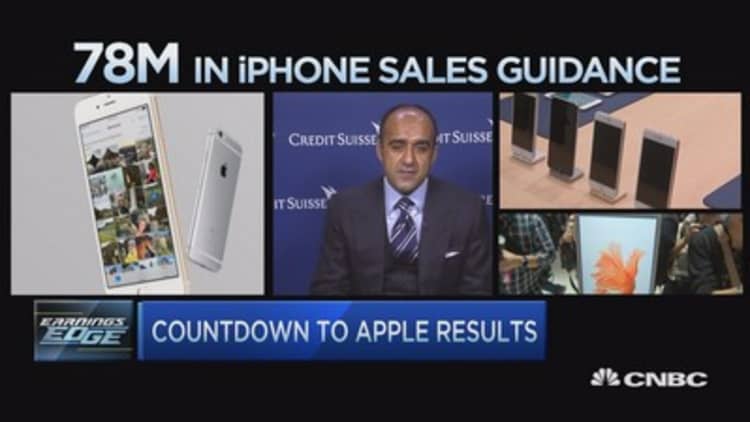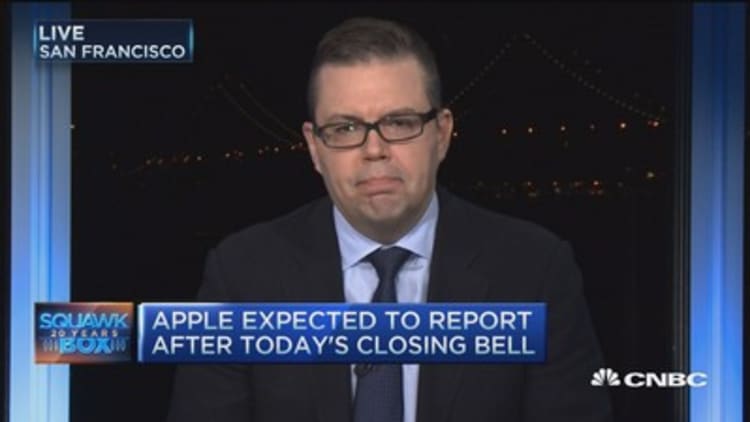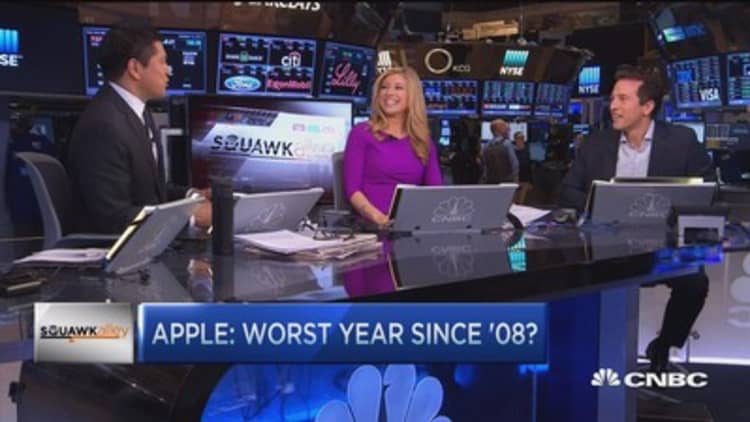


Tech industry researchers in Shanghai have noticed a small but telling insight into the iPhone's recent reach into China: Even the occasional fresh-meat street vendor can be seen waving an iPhone as he tends to his daily grind.
There's no solid indication of the vendor's social status or income level, but the scenario does likely show that consumers of all stripes in China are shelling out money for the high-end iPhone, which underscores how on point Apple is in a market that represents a huge chunk of the company's short- and long-term growth.
"We remain extremely bullish on China, and we're continuing to invest," said CEO Tim Cook on Apple's third-quarter conference call, in which the firm reported that iPhone sales saw a 112 percent year-over-year increase there. About 27 percent of Apple's revenue for the quarter came from China, though it was down about 21 percent from the previous quarter.
"Nothing that's happened has changed our fundamental view that China will be Apple's largest market at some point in the future," said Cook on the call.
While nothing changed Apple's view, the company did feel the need to reiterate that view in August when China fears sank the markets. In what was judged by many market watchers to be an unusual step — and one that may have even included regulatory risk — Cook emailed CNBC's Jim Cramer to say Chinese sales were strong.
China, with a swelling middle class, is the world's largest smartphone market, representing roughly 30 percent of global sales in the second quarter, according to research firm Gartner. With big expansion plans on tap for the region — Apple hopes to have 40 Apple stores open there by the middle of next year, up from 22 in the third quarter — the question isn't about whether or not Apple's growth in China will continue. It's about how much to bet that it will grow as fast as it has been, given the many headwinds associated with that particular market.
"China is an important region for Apple; it's the primary region to look at in terms of iPhone growth," said Brian Colello, a senior equity analyst at Morningstar. "If there are headwinds in China, it could have an effect. … Apple might not grow at the same pace after last year."
Last quarter, China contributed 60 percent of revenue and 80 percent of operating-income growth for Apple. UBS estimates that China accounted for nearly 40 percent of iPhone sales.
Apple shares tumbled by 3 percent on Monday. Since its July earnings — right before the extreme market volatility and China concerns took hold — its shares have been down 7.4 percent, marking Apple's worst year since 2008, putting its shares well behind the major market indexes over the past three months, which have all rallied back while Apple has not.
Apple global revenue trends
| Operating<br> Segments | Q3 2015 ($B) | Q2 2015 ($B) | Q3 2014 ($B) | Sequential change<br> Q2-Q3 (%) | Year over year <br>change Q3 (%) |
|---|---|---|---|---|---|
| Japan | 2.872 | 3.457 | 2.627 | -17 | 9 |
| Rest of Asia Pacific | 2.952 | 4.21 | 2.342 | -30 | 26 |
| Europe | 10.342 | 12.204 | 8.659 | -15 | 19 |
| Greater China | 13.23 | 16.823 | 6.23 | -21 | 112 |
| Americas | 20.209 | 21.316 | 17.574 | -5 | 15 |
| Total | 49.605 | 58.01 | 37.432 | -14 | 33 |
Source: Source: Apple - Data through end of 2015 fiscal third quarter (June 2015).
"In some respects it's becoming the single most important market, especially when it comes to growth," said Jan Dawson, chief analyst at Jackdaw Research.
Beyond expanding its retail store presence in China, Apple is emphasizing China more and more in terms of new features.
"Chinese cities dwarf those in any other countries when it comes to the new transit mapping features in iOS 9," Dawson said.
Yet at the same time, Apple is required to remain sensitive to China's strict censorship rules. Rather than try to decipher which articles would pass muster with Chinese authorities, earlier this month Apple decided to disable its news app, which is still in beta there. Nevertheless, Facebook CEO Mark Zuckerberg continues to court Chinese authorities, giving a speech in Mandarin as part of his charm offensive.
The immediate China risk is its economy.
"Given Tim Cook's email to Jim Cramer a few weeks back, it looks like Apple will report more great results in China for this past quarter, and I'd guess Tim Cook will be very bullish about China going forward, too," Dawson said. "The new iPhones were on sale in China from day one this year, which means sales should be higher compared to last year, which is an important driver of overall growth for the iPhone this year."
For any company with big stakes in China, current growth depends on what's going on with the country's economy, which has been hard to discern. While the official GDP growth number China released for the third quarter shows that it's on track to meet its target of 7 percent GDP growth this year, most economists have said that based on underlying data, such as falling industrial production, the actual number may be much smaller.
"You can see how the economy is going through an obvious contraction," said Nicole Peng, Asia-Pacific research director for research firm Canalys. Peng, who is based in Shanghai, notes that much of the large-scale infrastructure spending that helped fuel China's growth over the past few decades has ceased.
She also said that the country's technology industry, anchored by Internet behemoths Alibaba, Baidu and Tencent, has gotten leaner, with companies streamlining their operations and hiring less people.

Analysts still don't seem to think that the world's second-largest economy will hit crisis mode anytime soon, but factors like fewer exports and imports have created investor unease, volatile commodity prices and unfavorable currency conditions.
"China is volatile — it's an economy that has gone straight up for many years, and now it's slowing," said Michael Bapis, managing director and partner with the Bapis Group at HighTower, a wealth management firm. "Companies that are overvalued are going to get beat up."
For Apple, China's woes could mean "some speed bumps in the near term," as Cook said on last quarter's conference call.
Morningstar's Colello thinks that many of the economic risks have already been priced into Apple's stock, but added that if the Chinese economy does take a turn for the worse, it could "cause more customers to either switch to mid-range or lower-priced phones or hold on to their current phones for a longer time." That would mean lower sales for Apple.
An underappreciated risk in Apple's No. 1 market
Apple depends on what it considers to be its iOS's superior user experience to keep consumers upgrading to the latest iPhone, and much of this ecosystem relies on applications created by outside developers. Chinese developers have embraced iOS — analytics firm App Annie reported that in the first quarter, China overtook the U.S. as having the most iOS downloads from the App Store. This has translated into sales growth, too. For the fiscal third quarter, Apple reported that App Store revenue from China had more than doubled year-over-year.
But explosive growth in a market steeped in such cultural and political differences presents a downside. Over the past couple of months, the App Store in China has experienced two security breaches, both of which involved infected apps that apparently slipped past Apple's security-review process and that originated in China. A Chinese mobile advertising firm took the blame for the most recent incident, as it had dispersed code that allowed hundreds of apps to access users' personal data.
While breaches like this can happen anywhere in the world, "more often it happens in China," said Elias Manousos, CEO and co-founder of RiskIQ, a cybersecurity firm. "Geopolitical pressures have caused the Internet to operate differently in China, and as a result, it can be a little more dangerous for the average consumer over there."
Dawson said that as Apple grows in China, it's likely to see a growing number of threats and attempts to attack the iPhone and iPhone users, so it's also going to have to beef up its efforts to secure iOS and the iPhone.
Geopolitical pressures have caused the Internet to operate differently in China, and as a result, it can be a little more dangerous for the average consumer over there.Elias ManousosCEO and co-founder of RiskIQ
Manousos said that while Apple's reputation likely hasn't yet suffered because of the rogue activity, the firm will need to change the way it vets partners in China.
"Going forward, Apple will need to pay more attention to the needs of developers in all countries," said Amit Sethi, senior principal consultant at Cigital, a software security firm. "It will also need to improve its app review process."
When Apple releases its results Tuesday afternoon, tech watchers will be looking for any hints that point to how China's economic backdrop could impact Apple's December quarter — the company's most important, given holiday buying and the typical iPhone refresh period.
"There have been some concerns about the stability of the Chinese economy recently, although they seem to have lessened in the last few weeks, and there are also concerns that Apple will eventually max out its addressable market in China and return to slower growth. However, it shows no sign of doing that so far," Dawson said.
Long-term growth potential in China isn't going to play out by Tuesday afternoon, and short-term concerns about the Chinese economy won't be answered on any given day, either. Which leaves Apple in uncertain territory — its most important growth market on edge, while its next big product introduction remains a few quarters off.
"In the long-term view, we think that at the current price, investors are being rewarded for a company that's certainly more likely than not to continue to deliver a great product," said Morningstar's Colello. But he added, "If Apple can't deliver growth in December, then how can it expect to deliver in March or June until the next iPhone comes out?"






